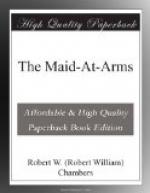“So all is well,” he said, gravely, holding my hands tighter. “Do you understand? All is well, Ormond.... We struck McCraw at Schell’s last night and tore him to atoms. We punished the Senecas dreadfully. We have cleared the land of the Johnsons, the Butlers, the McDonalds, and the Mohawks, and now we’re concentrating on Burgoyne. Ormond, he is a doomed man! He can never leave this land save as a prisoner!”
His grip tightened; a smile lighted his careworn face as though a ray of pure sunshine had struck his eyes.
“Ormond,” he said, “I have bred much mischief among us all, yet with the kindest motives in the world. If honor and modesty forbids an explanation, at least let me repair what I can. I have given your cousin Dorothy her freedom; and now, before I go, I ask your friendship. Nay, give me more—give me joy, Ormond! Man, man, must I speak more plainly still? Must I name the bravest maid in county Tryon? Must I say that the woman I love loves me—Magdalen Brant?”
He laughed like a boy in his excitement. “We wed in Albany on Thursday! Think of it, man! I showed her no mercy, I warrant you, soon as I was free!”
He colored vividly. “Nay, that’s ungallant to our Maid-at-Arms,” he stammered. “I’m flustered—you will pardon that. She rides with us to Albany—I mean Magdalen—we wed at my aunt’s house—”
The trumpet of the Legion was sounding persistently; the clatter of spurred boots filled the hallway; Ruyven burst in, sabre banging, and flung himself into my arms.
“Good-bye! Good-bye!” he cried. “We are marching with the left wing to Balston. I’ll write you, cousin, when we take Burgoyne—I’ll write you all about it and exactly how I conducted!”
I felt the parting clasp of their hands, but scarcely saw them through the tears of sheer weakness that filled my eyes. The capacity for deep emotion was deadened in me; the strain had been too great; the reaction had left me scarcely capable of realizing the instant portent of events.
The mellow trampling of horses came from below. I hobbled to the window and looked down where the troopers were riding in fours, falling in behind a train of artillery which passed jolting and bumping along the stockade.
A young girl, superbly mounted, came galloping by, and behind her spurred Sir George Covert and Ruyven. At full speed she turned her head and looked up at my window, and I think I never saw such radiant happiness in any woman’s face as in Magdalen Brant’s when she swept past with a gesture of adieu and swung her horse out into the road. A general’s escort and staff checked their horses to make way for her. The officers lifted their black cockaded hats; a slim, boyish officer, in a white-and-gold uniform, rode forward to receive her, with a low salute that only a Frenchman could imitate.
So, escorted by prancing, clattering cavalry, and surrounded by a brilliant staff, Magdalen Brant rode away from Varicks’; and beside her, alert, upright, transfigured, rode Sir George Covert, whose life she had accepted only after she had paid her debt to Dorothy by offering her own life to rescue mine.




